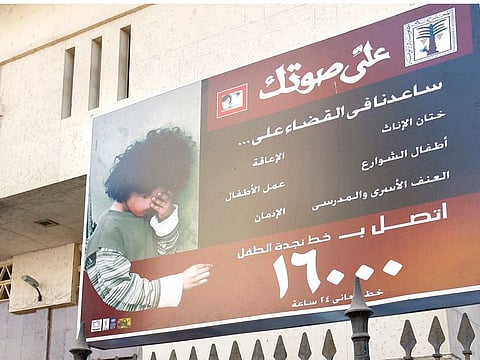Outrage in Egypt over girl's circumcision fatality
Doctor had performed on the child without Anesthesia or nursing support

Cairo: The recent death of a girl of circumcision has sparked outrage, sounding the alarm that the centuries-old practice is still alive in the conservative country years after it was banned.
Nada Hassan, 12, reportedly died due to complications as she was subjected to a female genital mutilation (FGM) operation at a private clinic in her hometown of Assiut, about 380 kilometres south of Cairo.
After the child's death, police arrested the doctor who had performed the illegal operation, her parents and an aunt on charges of complicity. The doctor was later released on a bail of 50,000 Egyptian pounds (Dh 11,627) pending the trial. The three others were released without a bail.
Nada's death came just a week before the International Day of Zero Tolerance for Female Genital Mutilation that is annually marked on February 6.
Investigations into the case found that the suspected doctor had performed on the child without anaesthetic or nursing support and that he is an obstetrician, not a surgeon, according to Egyptian media.
If convicted, the doctor could face up to seven years in prison under a 2016 law that criminalises FGM. Egyptian authorities have since mounted a string of anti-FGM campaigns across the country.
The state-run National Council for Women has condemned the child's FGM death as a "heinous crime" and called for applying the "maximum penalty" against those involved.
Egypt’s official Islamic authority, Dar Al Iftaa, has meanwhile renewed its edict proscribing the procedure as un-Islamic.
But Nada's death has come to cast doubts over feasibility of such efforts, according to detractors.
The Law
"The continuation of the female circumcision operations points to ineffectiveness of governmental initiatives and awareness campaigns especially in rural areas," said lawmaker Mona Muneer, who presented a query on Nada's death.
"Medicine and religion stand against these operations. However, the practice is still rampant," she added in a press statement. Around 90 per cent of women aged over 40 years have been subjected to FGM in Egypt, according to the findings of a government survey conducted in 2014.
In 2016, the Egyptian parliament approved a law toughening penalty against FGM. The law punishes anyone involved in the practice, banned in Egypt since 2007, by five to seven years in prison instead of a previous penalty of a maximum three years of imprisonment.
Parents subjecting their girls to the procedure face a jail term raging from one to three years.
The FGM practice, which includes the removal of all or part of the clitoris, is usually done for local girls before reaching puberty.
Advocates of female circumcision believe it is imperative for women’s chastity allegedly by curbing their sexual desires.
Experts say that severe forms of FGM can lead to life-long psychosexual problems and troubles related to menstruation, sexual intercourse and childbirth.
Prominent advocate of women's rights, Nehad Abul Qomsan, has blamed FGM persistence in Egypt on half-hearted enforcement of the law despite its tough penalties.
"It's because the law is mere ink on paper and it's because the application of the law doesn't depend on police alone, but it also hinges on other partners who don't do their respective role," she said in an article published in private newspaper Al Watan this week commenting on Nada's death.
She accused the Health Ministry of failing to adopt a "clear, systematic" policy to promote awareness about "this fatal crime". Nehad also put a portion of the blame on education authorities. "Did we teach our girls in schools that their bodies are sacred and that anyone who harms them must be reported to authorities, even if they are mom and dad?" she asked. "No. It's because everyone shrink from raising the ire of the bogyman of Islamism," she added.
In recent decades, Egypt has experienced a wave of Islamism that advocates female circumcision on religious and moral pretexts.
In the past, FGM was performed in Egypt by local midwives and even barbers without the use of anaesthetics, using knives or razors.
In recent years, however, some 82 per cent of FGM operations in Egypt have been performed by medical practitioners, according to official figures.
In December 2016, a criminal court in Egypt’s coastal city of Suez sentenced a medical doctor to one year in prison after a teenage girl died of complications after undergoing FGM surgery conducted by the physician.






